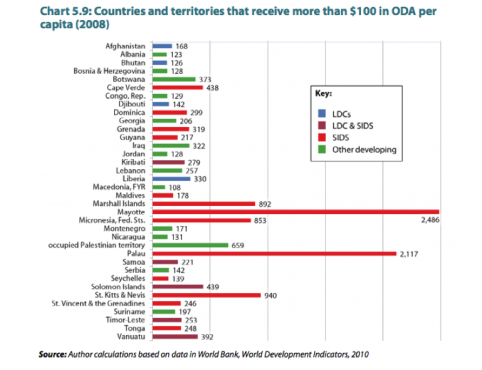
Mangrove tree shoots planted in Kiribati hold sand in place to combat erosion. (United Nations Flickr)
A humanitarian crisis lurks in the seemingly peaceful palms of the world’s small-island developing states – an estimated 52 island nations will become uninhabitable due to rising sea levels within the next 100 years. Leaders attended the Third International Conference of the United Nations on Small Island Developing States (SIDS) last month, and are already preparing for the costly evacuation of these islands and rehabilitation of their populations. The UN has declared 2014 the International Year of SIDS in an attempt to draw the international community’s attention to this disaster which will cost billions. The conference addressed the unique developmental challenges facing the SIDS and the status of these “climate refugees.”
Small-island developing states are especially vulnerable to climate change as they combat environmental degradation and provide for their populations with limited resources in relative isolation. Heavily reliant on imports and foreign aid (see UNDP chart below), SIDS’ populations face a diminishing supply of fresh water and housing, as well as disease from overcrowded populations. On Tarawa, an atoll and temporary refuge for citizens displaced from other parts of Kiribati, the population density is reportedly three times that of Tokyo.

(World Bank)
How has the international community responded to this emerging disaster thus far? Small-island developing states comprised 18 out of the 36 nations receiving over $100 per capita in official development assistance in 2008. That may be changing. 2013 marked a record highin humanitarian aid contributions across the globe, but assistance for SIDS decreased by 2.9 billion from 2010-2012 and is expected to continue its decline. For SIDS economies heavily reliant on aid flows, fluctuations in these external resources contribute to an already unstable situation.
Regardless of the level of development assistance, many small-island developing states are not making progress towards their Millennium Development Goals, and a few states are regressing. Economist S.S.A. Aiyar highlights the excessively long process for citizens to obtain property rights (up to 513 days in Kiribati in 2008). Such inefficiencies discourage foreign direct investment and underutilize foreign aid.
If aid to small-island developing states is to enable self-sufficiency and sustainability, it needs to be more directly coordinated with their governments and citizens to build capacity and ensure accountability. Strengthening the use of open data in SIDS governance could be a good place to start, and was a main point of discussion at the UN conference. The draft resolution from the conference encourages research and the establishment of “regional data repositories” to monitor statistics such as energy usage. The benefits for SIDS could be innumerable, from delaying environmental degradation to sharing feedback on disaster risk mitigation.
The challenge comes in making the data accessible against the clock, not in terms of availability, but in application. The resolution calls for “user-friendly” systems, yet gives vague suggestions on how to achieve this, especially given that the infrastructure for the collection and use of data in many SIDS is weak or nonexistent. The international community can help close the gap by allocating some aid towards creating better infrastructure for SIDS to collect data and use it to make evidence-based decisions.
Much of the environmental damage in small-island developing states is irreversible at this point. The world has already witnessed its first complete migration of an island populationwith the Carteret Islands in Papua New Guinea. The Third International Conference will prove important in determining next steps. Increasing the use of open data may reveal vital insight into improving the conditions of SIDS by making more effective use of development assistance.
